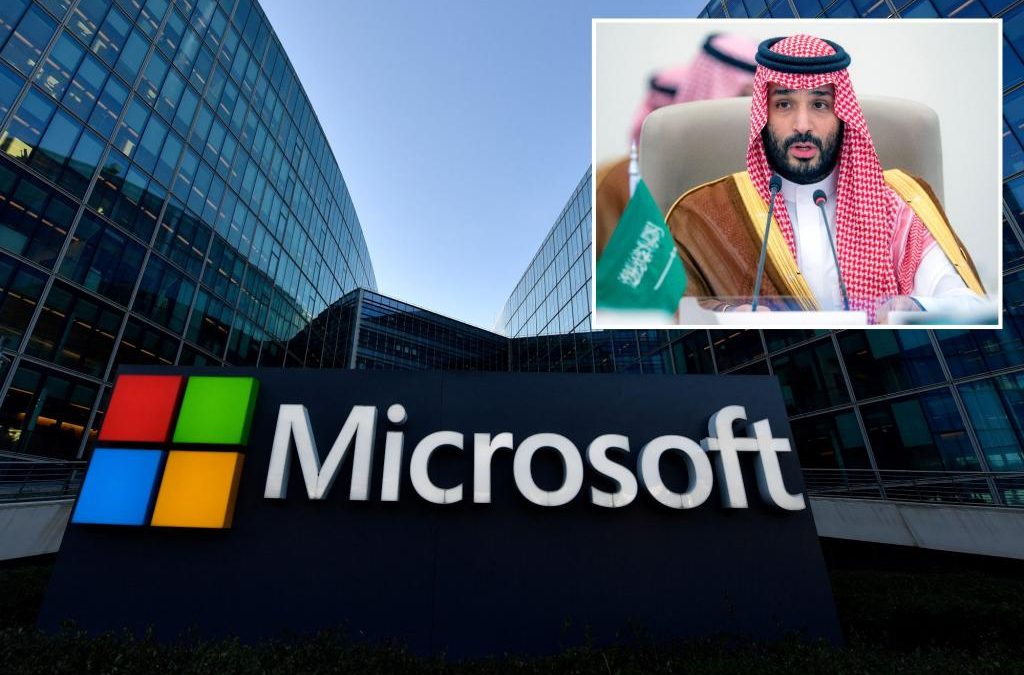Saudi officials announced that Microsoft invested $2 billion to build a cloud storage facility in the kingdom — and activists are warning that the move could pose danger to users’ personal data.
The announcement was made at LEAP 2023, an annual tech conference held in Riyadh, Saudi Arabia, where high-profile bosses fraternize with Saudi officials and planners of Neom, the $1 trillion mega-development by Crown Prince Mohammed bin Salman.
Microsoft’s gamble in Neom will see a data center region built in the megacity, similar to Google’s cloud center plan in Saudi Arabia that was harshly criticized for allowing the Saudi government to infiltrate western tech firms.
Alan Woodward, a computer technology expert at the University of Surrey in England, told Business Insider that Saudi authorities would potentially be able to access vast amounts of sensitive political information stored via the cloud.
“The government can basically do what it wants,” Woodward said. “And if you can imagine all the things that are put online it could be something quite edgy, it could be used against dissidents.”
Woodward added that Saudi officials told companies like Microsoft: “If you want to operate in this country, you’ve got to keep the data in this country.”
“That’s for an obvious reason: So they could potentially access it,” he said.
Marwa Fatafta, an analyst with digital rights group Access Now, questioned whether Microsoft actually investigated “how they plan to mitigate potential human rights abuses or privacy violations (by) building such infrastructure.”
She suggested to Insider that the move could mean Microsoft is handing over user data on a silver platter, describing Saudi Arabia as a country with a “dismal” human rights record.
Microsoft’s press release on the investment didn’t share the sentiment, and instead touted the datacenter region as a development that “will address organizations, enterprises and developers’ “data residency, security, privacy and compliance needs,” according to Samer Abu-Ltaif, Corporate VP and President, Microsoft Central and Eastern Europe, Middle East and Africa.
President of Microsoft Arabia, Thamer Alharbi, added that the investment “reflects Microsoft’s longstanding commitment to Saudi Arabia and its ambitions for digital transformation.”

The Post has reached out to Microsoft for comment.
Critics have long disagreed with Abu-Ltaif and Alharbi, especially since Microsoft — the world’s second-biggest tech behind Google parent Alphabet — refused to disclose how they will shield privacy of data housed in Saudi Arabi.
The kingdom itself also has blurred privacy laws, and has jailed people in the past for speaking out against the government on social media.
Earlier this month, Saudi woman Fatima al-Shawarbi was sentenced to 30 years for criticizing the Neom project on Twitter, according to Insider.
Al-Shawarbi, who’s in her 20s, was also reportedly arrested in 2020 for speaking out against Saudi Arabia’s treatment of women, calling for a constitutional monarchy rather than the dictatorship that currently exists.
As of September, Saudi Arabia is set to implement its first data protection plan — the Personal Data Protection Law (PDPL) — though it’s unclear if it will prevent prosecution related to free speech on social media in cases similar to al-Shawarbi’s.
US-based privacy pundits have also been against the construction of Neom, which is set to occupy a 10,200-square-mile area in northwestern Saudi Arabia’s Tabuk Province once it’s complete in 2025.
Neom’s website promises to “power the future,” and touts plans for a “secure data center,” as well as a “mixed-reality metaverse” and “advanced robotics.”

The so-called “economic engine” is costing $500 billion to build, the site says, with a chunk coming from the Public Investment Fund (PIF) of the Kingdom of Saudi Arabia, one of the world’s largest sovereign wealth funds.
PIF, established in 1971, is headed by bin Salman, who was accused of ordering the brutal killing of journalist Jamal Khashoggi.
Critics have also pointed to two ex-Twitter employees who were accused in 2019 of funneling private data about Saudi critics to an ally of the crown prince as evidence the Saudi government shouldn’t be trusted.
Source




